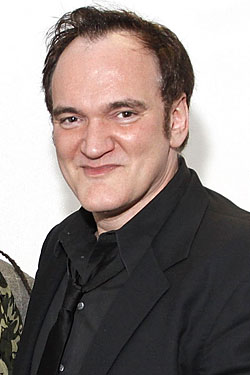
This weekend, we met with Quentin Tarantino, who was still in town after a MoMA Q&A with Elvis Mitchell this past Thursday. As if the weekend’s snowstorm wasn’t inconvenience enough, his Hugo Boss coat — which contained his I.D., credit cards, and about $2,000 in cash — was stolen from the West Village bar Galway Hooker on Saturday. Taking pity on him, we paid for some French-vanilla lattes and mimosas the next day, and took the opportunity to ask him about his next film project and how Germans and Israelis perceived Inglourious Basterds.
So, are we in for an Inglourious Basterds prequel? Apparently not yet — even though Tarantino says he has 40 pages of it written. He’s not giving up on the idea or the script, especially if the original film does well at the awards shows. But he’s got another project, which he’s keeping under wraps, coming first. It’s going to be “smaller, less epic” in scale than Basterds, and in a “different genre entirely.” He says he thinks he can finish it in a five- to six-month period of intensive writing.
Still, he only recently returned from the foreign press tour for Basterds, and the reactions in Germany and Israel were foremost on his mind, for obvious reasons. In the former country, he saw a transformation in the audience. We’ll let him explain:
only recently returned from the foreign press tour for Basterds, and the reactions in Germany and Israel were foremost on his mind, for obvious reasons. In the former country, he saw a transformation in the audience. We’ll let him explain:
ly returned from the foreign press tour for Basterds, and the reactions in Germany and Israel were foremost on his mind, for obvious reasons. In the former country, he saw a transformation in the audience. We’ll let him explain:
from the foreign press tour for Basterds, and the reactions in Germany and Israel were foremost on his mind, for obvious reasons. In the former country, he saw a transformation in the audience. We’ll let him explain:
eign press tour for Basterds, and the reactions in Germany and Israel were foremost on his mind, for obvious reasons. In the former country, he saw a transformation in the audience. We’ll let him explain:
our for Basterds, and the reactions in Germany and Israel were foremost on his mind, for obvious reasons. In the former country, he saw a transformation in the audience. We’ll let him explain:
Basterds, and the reactions in Germany and Israel were foremost on his mind, for obvious reasons. In the former country, he saw a transformation in the audience. We’ll let him explain:
>, and the reactions in Germany and Israel were foremost on his mind, for obvious reasons. In the former country, he saw a transformation in the audience. We’ll let him explain:
eactions in Germany and Israel were foremost on his mind, for obvious reasons. In the former country, he saw a transformation in the audience. We’ll let him explain:
Germany and Israel were foremost on his mind, for obvious reasons. In the former country, he saw a transformation in the audience. We’ll let him explain:
Israel were foremost on his mind, for obvious reasons. In the former country, he saw a transformation in the audience. We’ll let him explain:
foremost on his mind, for obvious reasons. In the former country, he saw a transformation in the audience. We’ll let him explain:
his mind, for obvious reasons. In the former country, he saw a transformation in the audience. We’ll let him explain:
r obvious reasons. In the former country, he saw a transformation in the audience. We’ll let him explain:
asons. In the former country, he saw a transformation in the audience. We’ll let him explain:
e former country, he saw a transformation in the audience. We’ll let him explain:
ntry, he saw a transformation in the audience. We’ll let him explain:
a transformation in the audience. We’ll let him explain:
ation in the audience. We’ll let him explain:
audience. We’ll let him explain:
e’ll let him explain:
et him explain:
in:
ote>
“When Germans are watching World War II movies, they’re used to cringing. Why they make themselves endure it, I don’t know. That is just the way it is for them, and they expect that that’s the way it’s going to be. And they’re always forced to look at it from the guilt perspective. [It’s a] World War II movie, and nothing’s going to fucking change that. But, as [Basterds] goes on, all of a sudden, that starts dropping away, and they actually got caught up in the story. And they’re really caught up in the story — it starts getting really funny. And it gets laughs. And all of a sudden, you have a German audience watching a movie about World War II — and they’re allowed to laugh! They’re allowed to enjoy it! And the fantasy [of assasinating Hitler] is just as much their fantasy as anybody else’s.”
So, the Germans love it. How about those Israelis?
ermans love it. How about those Israelis?
it. How about those Israelis?
t those Israelis?
elis?
quote>
“So now, in Israel, I’m watching the film, and we get into the theater sequence. And literally, not when Hitler gets killed, but when you hear Shoshanna’s voice say, ‘This is the face of Jewish vengeance,’ the whole theater just erupted in applause. I think there were two guys that started it, but everyone jumped in. And you know something? It was violent. It was scary. There was violence in that cheer. It wasn’t like cheering Indiana Jones. There was something bloodcurdling about it. I don’t want to overstate it, but there was an edge to it. There was violence in it … there was blood in the air, which was wild. It was a wild thing to experience. It was a great experience, and it was real.”
It certainly sounds like a Tarantinoesque moment.




